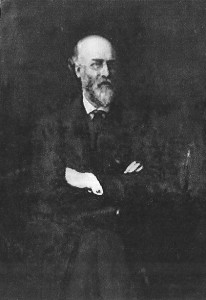Educationalist, First Secretary of the CGLI and Founding Principal of Finsbury Technical College.
 Born in London Philip Magnus studied at University College, London graduating in the Arts in 1863 and the University of London graduating in science in 1864. After graduating he continued his theological studies between 1865 and 1866 in Berlin. On returning to London he became a minister at the Berkeley Street Synagogue but gradually became more involved in teaching, lecturing and examining. Philip Magnus in addition to his private teaching he was professor of the Catholic University and wrote a text book entitled “Lessons in Elementary Mechanics” that became a standard work for many years. He increasingly questioned the existing practices and systems of education and was perceived as a radical.
Born in London Philip Magnus studied at University College, London graduating in the Arts in 1863 and the University of London graduating in science in 1864. After graduating he continued his theological studies between 1865 and 1866 in Berlin. On returning to London he became a minister at the Berkeley Street Synagogue but gradually became more involved in teaching, lecturing and examining. Philip Magnus in addition to his private teaching he was professor of the Catholic University and wrote a text book entitled “Lessons in Elementary Mechanics” that became a standard work for many years. He increasingly questioned the existing practices and systems of education and was perceived as a radical.Soon after the City and Guilds Institute of London for the Advancement of Technical Education (CGLI) assumed responsibility for the technological examinations from the Society of Arts (SoA/[R]SA) an advert appeared in Nature for the position of an “Organising Director and Secretary”. The post initially was part-time and carried an annual salary of £ 400. Philip Magnus was the successful candidate who because of his background and being a person possessing the necessary vision to develop new and innovative approaches to technical education was seen as an ideal candidate for the position. One of the first challenges was to manage the very successful Technical School in Cowper Street, London. The student numbers had grown significantly and the existing accommodation and facilities were now inadequate. An extensive range of evening classes were provided for artisans wanting to learn about the basic principles of they work. Classes were provided for chemists, dentists, engineers, telegraphics, and printers – the list was truly remarkable. Eventually on 26th July 1880 the CGLI Executive Committee agreed to establish a new institution namely the Finsbury Technical College. Philip Magnus was appointed as its first Principal (1883-1885) and drafted the overall strategy for the new institution. The task of developing the schemes of work and methods of instruction fell to the professors namely Henry Armstrong (1848-1937) (1), William Ayrton (1847-1904) and Silvanus Thompson (1851-1916). Thompson later became Principal of the College and held the post for thirty years. These three remarkable individuals pioneered new teaching techniques in science education particularly the experimental aspects of science and electricity. [I have provided more detail about the Finsbury College and its teachers in a separate biography]. Magnus was the driving force behind the development of the college. Even at this time he was highlighting through his writings and lectures the massive investment in technical education being made in Germany compared with Britain and the consequences for Britain’s industrial future. He wrote a seminal text book on Mechanics and his publication “Industrial Education” (1888) is considered a classic of its kind. He was very influential in the development of the Central Institution located in South Kensington, (opened in June 1884), and its existence was due to the support from the City and Guilds both financially and through the expertise of Magnus. Magnus was a member of the London School Board in 1890 and 1891, a fellow of the London University Senate from 1900 and Chairman of the Education Committee of the Borough Polytechnic. Sir Philip Magnus became the leading authority on technical education and was a significant and influential member of the Royal Commission on Technical Instruction – the Samuelson Report (1881–1884). Portrait of Bernard Samuelson shown below.
In spite of his status and reputation he experienced many setbacks during his life and career for further details see Lang (2). A remarkable individual and a great supporter of the creation of technical education who made significant contributions to its development.
Magnus wrote two excellent books: Educational Aims and Efforts 1880-1910′ Longmans, Green, and Co. 1910. and ‘Industrial Education’ Kegan Paul, Trench and Co. 1888. London – well worth reading.
(1) Van Preach. G. ‘H.E. Armstrong and Science Education.’ John Murray. 1973.
(2) J. Lang. “City and Guilds of London Institute. Centenary 1878 – 1978.” CGLI publications. 1978.
(3) B. Bailey. “Sir Philip Magnus.” Oxford Dictionary of National Biography. 2004.
(4) F. Foden. “Philip Magnus: Victorian Educational Pioneer.” Vallentine, Mitchell-London. 1970. Frank Foden has written the seminal biography of Magnus.
(5) P. Magnus. “Industrial Education.” K. Paul and French and Co. 1888.


Recent Comments